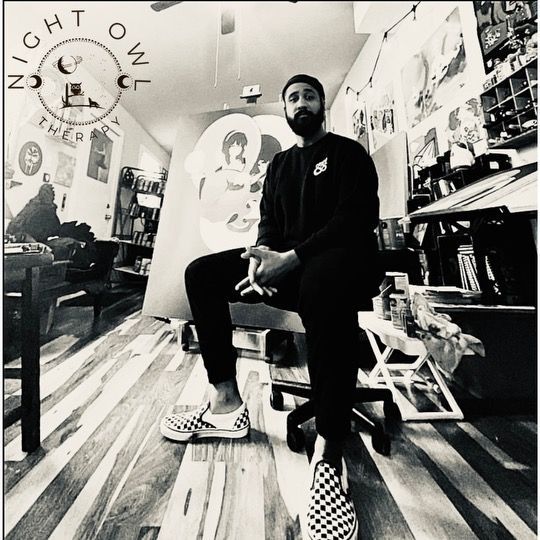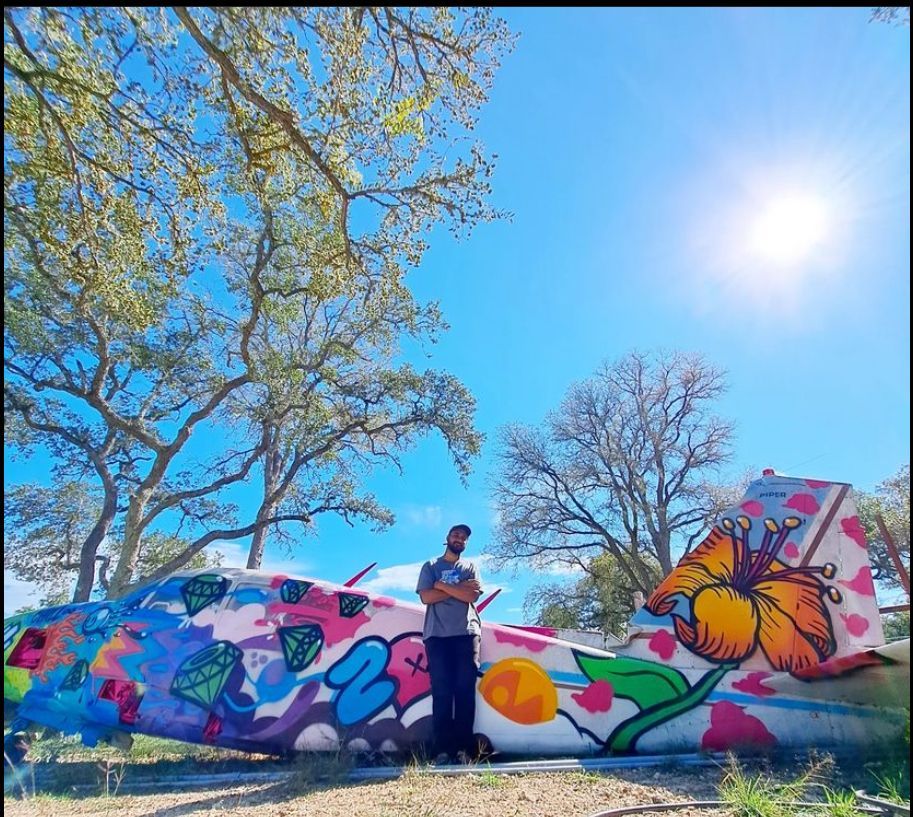
WE'RE EXCITED TO FEATURE JOHNNY DUNCAN AS OUR FEATURED NIGHT OWL FOR JUNE 2024
Meet Johnny Duncan (Jenkins2D), a Colorado-born Texas-grown multidisciplinary artist, Satellite member of the Blue Dozen Collective from Austin, Founder of First Friday New Braunfels, and creator of streetwear brand Chill Infinity. Calling New Braunfels his home where he creates kaleidoscopic works that are known for being vivid, iconic, and deceptively simple. He discusses navigating the art scene through the lens of a “racially ambiguous” person, the sexual objectification of art(ists), and the worst things that you can tell an artist. We are most grateful for his authentic and vulnerable response to his experience of therapy as “hyperbolic mind chamber”, and the great insight for those who are reluctant to seek therapy.
Hi Johnny. Tell me a little bit about your background as an artist and a muralist.
So, I've been making art my whole life really. I mean, I was like 3 or 4 [years old], sitting with my grandpa and he'd like bust out this roll of tracing paper and would just describe these characters to me… like whether it be a gingerbread man…animals and all kinds of stuff. So, I was always doodling really young. Coloring books were my best friend…and then I eventually was making comics in middle school. I was always just drawing pictures… Then, when I discovered painting and street art, that's when everything kind of changed. That’s when I knew I like art. I was like “I want to draw.” I didn't know what I wanted to do, but after that, there was no going back. I want to make art, I want to paint walls, I want to paint on canvas, and I wanna make cool stickers… and it just was the whole culture sort of ate me up. I don't know. It's just always been there, and it's kind of all I've known.
Boundaries show up in all areas of life. How have boundaries showed up in your area of life? For example, setting boundaries with friends, collectors, venue owners, etc…
That's been an ongoing thing that I'm still learning, since so many things are almost case per case scenario, like when it's with a collector versus with a collaborator. I feel it's become really important to me to limit my accessibility for the sake of my stability. I also feel like just giving myself important rest time, and also how I communicate to people especially in professional settings… I think it protects myself. Not everybody's my friend, right? Then, when it comes to my friends, that’s like a whole different language that we share. I have to navigate that authentically. It's just kind of taught me a lot about myself and how I feel best in being true to myself... and just in good standing with who I am with, what I'm doing, and what I'm supposed to be presenting. It's weird. I feel like I'm still discovering [boundaries], but it's invaluable because I feel like it's protected my peace and that's really what it's all about.
Everybody experiences obstacles in life. Have you experienced any social stigma or prejudice as an artist? People treating you differently or less than—or putting you on a pedestal, like you’re a king—because you’re an artist?
Yes. Hahaha. Definitely both ways, you know? Because I think in the terms of what sort of art that I make people will jump to their own conclusions about how my mind works. Depending on where the perception is coming from, it can be like definitely getting judged for the psychedelic nature of work, or the the cartoon nature of my work… Then, of course, me being an ambiguous dark person…there's already so much speculation as to what my race is…There's always these things that don't really mean anything in any sort of way other than when these people are judging me are also treating me a certain way… Sometimes that's been nasty. Sometimes people can be kind of weird, you know? I feel like people have objectified artists, too. It's weird because as an observer of the world you're probably one of the most observed, so there's all these stigmas that are attached. People also just feel like jumping to conclusions on how they can treat you because they see you a certain way, in such an array of ways, in my experience.
Tell me about some of the roadblocks that you have encountered as an artist and how you've managed it.
So one of the things is that I live in a smaller town, and the general consensus of what is art in this area is one thing that I have had to overcome, and still am, but it's come a long way. Also, this journey has forced me to go elsewhere. I've done work all over Texas, New York, London, Japan, and Denver… So, it's like jumping around. It's opening up the scope of what I need to be doing. Also, just learning the business that no one taught me has been one of the biggest things… Balancing my undying commitment to not working 9:00 to 5:00, and just make art, and survive off of my craft… but also doing that in a way where I'm not just creating artwork that I don't want to create, that means nothing to me, just because I can get paid. I have to do all those things while being true to myself, so that I feel watered and fed, and not like I'm just being drained. That's something that I had to do a lot of… was like take [jobs] that I don't even want to do… and it just doesn't feel good. It's not worth it because in the end you're just gonna get more of that work requested of you, and that's not what I'm trying to share. That's not what I'm trying to put out.
What role has therapy or self-care played in your life?
I would say that the self-care that I've implemented since spending time in therapy is monumental to how I maneuver now. I'm always taking steps forward with my care in mind, knowing that the more I can care for myself the better that I can care for others, like my son, my work, my friends, my family, my clients… l feel like everything I've done inward is reflecting my life in the outward, and that’s because I'm always working on healing… So much so that I've called it the hyperbolic mind chamber because it's allowed me to almost go inward. In just an hour once a week, I get way stronger in such a way by learning about my boundaries, and learning about protecting my peace, and learning about understanding my reaction to my emotions, and what I need to do with them. In every single way, it's made my life better, and my work better. I feel even that attention to detail is reflected in my paintings and in my living.
I would just literally urge everybody in the world to [go to therapy]. Even if you don't think you need to, like, there's some shit there. I'm basically open to putting myself under microscope with myself. My therapist is such a cool dude. We would be best friends, but we can’t be…and so when I'm in [therapy], it's almost like I'm wearing a lab coat with myself. There's another version of myself where we're just looking at me under a microscope…and I'm the kind of person who is like “I wanna clean this [life] up. I wanna Polish this” because I understand what it means to live, and I'm trying to live the best I can. The better I become just makes living better, like my everyday living…like even dealing with perceived problems.
Is there anything that you would like the art world to know, whether it be collectors, friends, other artists, as far as etiquette?
There’s a lot, but I think we need to start here... We need to stop telling artists that “If you put that on a shirt, I'll buy it.” Then, when you put it on a shirt, they don't buy it. That's gotta be the worst thing in the world because how many shirts have I produced that a person basically requested, and didn't buy? It's every single shirt I've ever produced. So be a buyer of your word. If you're gonna support, support. I feel like we just feed off of yall. I wouldn't be anything without an audience. I mean, sure I would still make art, and it would still mean everything it means to me, but I love that I get to share it, and then it you know gets to be what it is to everyone else that enjoys it… but like come on. It's like, go to the DJ show, it's like, if you tell your homie you're gonna go, or you tell this this creator that you're gonna support, then support because we need you. We need you. We do this for you, you know?
I hear what you’re saying... What is a valuable lesson that you've learned in your industry?
Hmmm. Don't. Make. The shirt.
But really, I would say, vet your clients. I've been scammed, and that really set me back. I thought like I was doing a big deal. I was high on the idea of the big sale. You need to be careful protect. Ultimately, just protect yourself because you need to protect your work, too. I think that goes in a lot of different ways. Don't make work you don't want to make because then you'll get stuck doing that, if that finds success, and that's what you get known for, and you're not passionate about it… Protect yourself in ways where you’re actually pricing your work to where it's valuable because if you're underselling yourself, then you're doing just that. You're underselling yourself. You want to be able to be the value that you feel in your work. So, in every single way as an artist you need to always protect yourself, protect your time, protect your energy, protect your heart, just as a person. It’s all the same.
Thank you, Johnny. So, what would you say to someone who is reluctant to seek therapy?
Um. That’s exactly why you need to go.
Community Partners
We couldn't serve our community without the help and support of our partners. Discover their offerings for additional resources.
All Rights Reserved | Night Owl Therapy 2024
















